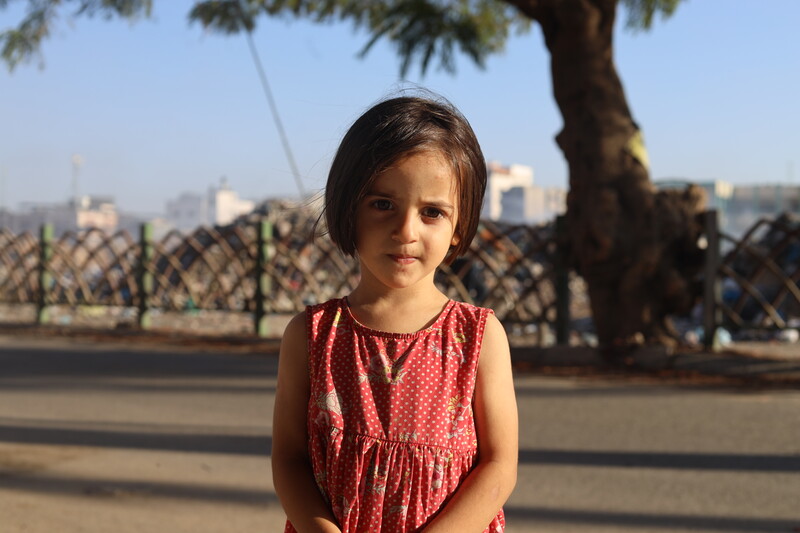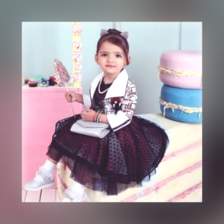The Electronic Intifada 14 October 2024

Deema El-Nabih, the author’s granddaughter.
My granddaughter Deema reached her third birthday in March.
Although she is still very young, she has shown a highly inquisitive nature. Eager to explore and learn more about the world around her, she sometimes asks challenging questions.
I express genuine interest in her inquiries and try to provide answers that are appropriate for her level of understanding.
A few days ago, little Deema asked me a very difficult question:
“Why did they destroy our house, Grandpa? Why?”
Sounding angry and sad, she wanted an explanation as to why an Israeli warplane attacked our family home and reduced it to rubble.
The house was situated in the al-Zaitoun neighborhood of Gaza City, where I had lived contentedly with my large family. On 20 October 2023, our neighborhood came under heavy Israeli bombardment, forcing people to flee for their lives.
We sought refuge in a United Nations school shelter.
Three days after our evacuation, one of my neighbors called and told me that airstrikes had damaged our family house. When I went to check on the place the following day, I realized that my neighbor had underplayed the situation.
I stared in horror: Our house, along with many others, was leveled. The loss of our beautiful home, as well as the valuable belongings we had inside, has had dire consequences for my family.
Shared emotions
Many wonderful memories were created in the house. Weddings, birthday parties, going gaga over cute newborn babies.
I vividly remember the joyful party we held to celebrate Deema’s second birthday on 28 March 2023.
There was no party this year.
Deema’s question – “Why did they destroy our house?” – was perfectly valid, and she had every justification for her anger and sadness over the destruction of our house.
What did we do to deserve this undue hardship?
Trying to respond to Deema’s inquiry, I first gave her a big hug and acknowledged her feelings as healthy and normal.
“Very like you, Deema, I’m sad and angry about the loss of our beautiful house,” I said.
Then I told her that our house was not the only house destroyed; many families in Gaza have endured similar devastating experiences. I assured her that Gaza’s destroyed buildings would be reconstructed.
“Sweetie, we will rebuild our house more beautifully and have a lovely room for you,” I said, emphasizing that Deema, as well as her younger (and only) brother Baraa’, would always be safe and cared for.
“We dearly love you and Baraa’. We will always look out for both of you, honey,” I promised.
Although my response was not perfect, I think it alleviated Deema’s anxiety and also helped her develop empathy for other people’s situations.
However, the main part of Deema’s inquiry remained unexplained – the reason Israeli military forces demolished our house. This issue touches on several events and concepts that were too heavy for Deema’s mind to get around.
The whys
These start with the Balfour Declaration, the 1917 letter in which Arthur Balfour, Britain’s foreign secretary at the time, wrote that the British government was committed to the creation of a national Jewish homeland in Palestine.
The letter is short, succinct and has had devastating consequences that are peaking now with a genocide in Gaza:
“His Majesty’s government view with favour the establishment in Palestine of a national home for the Jewish people, and will use their best endeavours to facilitate the achievement of this object, it being clearly understood that nothing shall be done which may prejudice the civil and religious rights of existing non-Jewish communities in Palestine, or the rights and political status enjoyed by Jews in any other country.”
The declaration contained no mention of the indigenous Palestinian population who constituted 94 percent of the country’s population at the time. They were dismissively referred to merely as “existing non-Jewish communities in Palestine.”
This majority was promised only “civil and religious rights,” not political or national rights. By contrast, Balfour ascribed national rights to what he called “the Jewish people,” who in 1917 were a tiny minority in Palestine.

A composite shows the author’s house before and after Israel destroyed it.
Over the following over 30 years of British colonial rule, the British government substantially supported the Zionist state-building project in Palestine, particularly by enabling largely unchecked migration from Europe.
This period culminated in the Nakba.
Israel was established in 1948 on 78 percent of historic Palestine. This was preceded and accompanied by systematic and violent ethnic cleansing operations that saw Zionist (pre-state) militias expel two thirds of indigenous Palestinians from their homes and lands, turning them into refugees in the remaining Palestinian territories (the West Bank and East Jerusalem and the Gaza Strip), in neighboring countries, and across the world.
The nascent Israeli state confiscated their lands and properties under a 1950 law of absentee property to make their forced displacement permanent.
It even created an Orwellian category for those who were displaced from their homes but wound up inside the borders of the new state, as “present absentees” to legalize the theft of their properties too.
War, occupation and apartheid
After its establishment, the region was marked by a period of deep instability. Neighboring countries were appalled at the new reality imposed on them from outside and the abuse of their fellow Arabs, the Palestinians.
Israel provoked and probed, eventually sparking war in 1967 for which it had prepared for years. The Israeli military invaded and occupied the remaining Palestinian territories, along with areas of Egypt, Lebanon, Syria and Jordan.
While some territories were eventually handed back, Israel’s occupation of Syrian and Lebanese territory and, of course, the rest of Palestine, has continued until this day.
Palestinians living under Israel’s occupation have now suffered decades of subjugation and discrimination. We have no self-rule and no control over our own destinies. So racist is Israel’s military occupation that it has been denounced as a form of apartheid by every significant human rights group in the world, including Israel’s own B’Tselem.
We are constantly discriminated against and racially abused, from the very top.
We’ve been called “worms” and ”human animals.” Our very existence has been denied.
One Israeli government body called for more than 2 million Palestinians to be forcibly displaced from the Gaza Strip, and another Israeli minister suggested nuking Gaza and exterminating all 2.3 million inhabitants.
Gaza besieged
Since 2007, Israel has imposed an illegal and vicious blockade on the Gaza Strip, turning it into the world’s biggest open-air prison. The situation has been exacerbated by Israel’s military attacks and collective oppression of Palestinians.
And from 2008, Israel waged five major military aggressions on Gaza that have now culminated in the current genocidal assault, an assault so brutal that Amnesty International warned the international community to act immediately to prevent the enclave becoming “a giant graveyard” as far back as last October.

The author with his granddaughter.
If my granddaughter Deema were mature enough, she would find the historical and political context given above very informative and enlightening about the Palestinian cause and Israel’s ongoing crimes against us, including the destruction of our family house.
However, she would feel utterly despondent that the international community has failed to uphold human rights and put an end to our suffering.
She would groan, “Isn’t this a dark stain on our shared humanity?”
With a gloomy look on her face, she would mutter to herself Persian poet Saadi Shirazi’s words:
Human beings are members of a whole,
In creation of one essence and soul.
If one member is afflicted with pain,
Other members uneasy will remain.
If you have no sympathy for human pain,
The name of human you cannot retain.
Sheer hypocrisy
However, what would baffle Deema most and enrage her in equal measure is how some Western governments, such as the US, Germany and UK, claim to be advocates of human rights while providing Israel unwavering political and military support to continue its war crimes with impunity.
“Isn’t this sheer hypocrisy? Isn’t this complicity in Israel’s war crimes against the Palestinian people?” an older Deema would likely rail with frustration.
“How can these people sleep at night while the slaughter is being done with their full backing?” she would add in anger.
Although my granddaughter’s attitude would be completely understandable, I would not leave her alone in this foul mood.
As I have always had a fairly optimistic outlook on life, I would try my best to raise Deema’s morale. I would tell her about the growing awareness across the globe of the rightness of the Palestinian cause, which is a historical turning point.
People from all corners and all backgrounds of the world have been mobilizing for the Palestinian people. Tactics have included demonstrations, sit-ins, boycotts, and strikes. Notably present in such events have been international bodies and Jewish and Israeli groups.
One significant outcome of the solidarity movement and narrative change is the recent resignations of some Western officials, in protest at their own governments’s support for Israeli atrocities.
This has revealed the many grave policy errors of these governments and highlighted the broader issue of complicity in Israel’s war crimes.
In one remarkable instance, 12 of President Joe Biden’s administration officials publicly resigned and issued a letter of “service in dissent,” stating that US policy on Palestine since last October has been “morally reprehensible” and a “failure.”
Deema would be cheerful. She would greatly appreciate the current solidarity movement with the Palestinian people.
But she would hope for international intervention to end the oppression and ensure Palestinian rights. She might even conclude on a positive note that:
“We Palestinians are doggedly determined to live independently in peace and dignity. If Israel kills some flowers, many more will bloom. Israel cannot stop the spring!”
Hassan El-Nabih is an educator and writer from Gaza.


